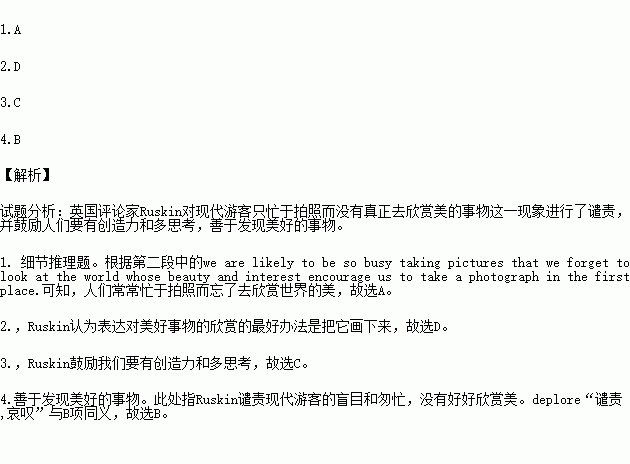题目内容
Whenever something looks interesting or beautiful, there is a natural desire of us to capture (捕捉)and preserve it—which means, in this day and age, that we are likely to reach for our phones to take a picture.
Though this would seem to be an ideal solution, there are two big problems associated with taking pictures. Firstly, we are likely to be so busy taking pictures that we forget to look at the world whose beauty and interest encourage us to take a photograph in the first place. And secondly, because we feel the pictures are safely stored on our phones, we never get around to looking at them, so sure are we that we’ll get around to them one day.
The first person to notice the problems was the English art critic(评论家), John Ruskin. He was a keen traveler who realized that most tourists make a poor job of noticing or remembering the beautiful things they see. He argued that humans have a natural tendency to respond to beauty and desire to have it, but there are better and worse expressions of this desire. At worse, we get into buying souvenirs or taking photographs. But, in Ruskin’s eyes, there’s just one thing we should do—attempting to draw the interesting things we see, regardless of whether we happen to have any talent for doing so.
Ruskin said, “Drawing can teach us to see: to notice properly rather than gaze absent-mindedly. In the process of recreating with our own hand what lies before our eyes, we naturally move from a position of observing beauty in a loose way to one where we acquire a deep understanding of its parts.”
Ruskin deplored the blindness and hurry of modern tourists, especially those who prided themselves on travelling around the whole Europe in a week by train, “No changing of places at a hundred miles an hour will make us stronger, happier, or wiser. There was always more in the world than men could see, if they ever walked slowly; they will see it no better for going fast. The really precious things are thoughts and sights, not pace.”
1.According to Paragraph 2, when taking pictures, people tend to ________.
A. forget to appreciate something attractive on the spot
B. find it hard to learn skills of taking good pictures
C. find a good way to keep things in their minds
D. have a chance to meet the challenge of new technology
2.According to Ruskin, what should travelers do to best express their appreciation of and desire for something beautiful?
A. To speak it out openly.
B. To photograph it instantly.
C. To purchase it directly.
D. To paint it immediately.
3.From the fourth paragraph, we can infer that Ruskin encourages us to be ________.
A. considerate and determined
B. active and adventurous
C. creative and thoughtful
D. sensitive and ambitious
4.The underlined word “deplored” in the last paragraph is closest in meaning to ________.
A. appreciatedB. criticizedC. favoredD. ignored
 七星图书口算速算天天练系列答案
七星图书口算速算天天练系列答案

 other to build strong bodies.
other to build strong bodies.